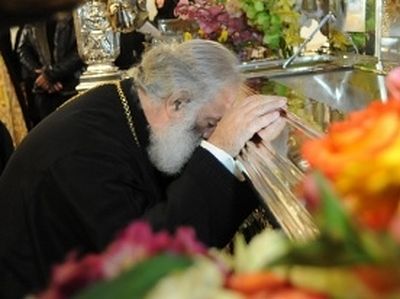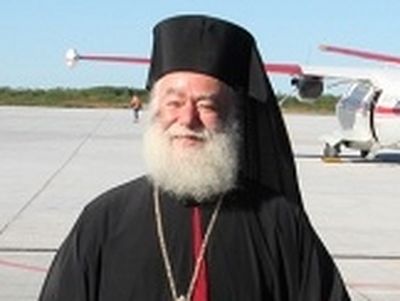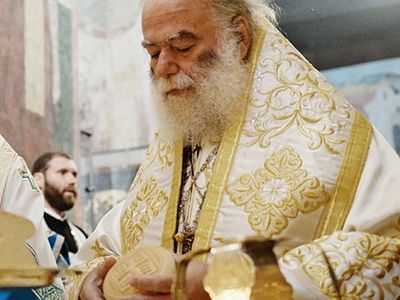Moscow, September 3, 2015
On August 28, 2015, His Holiness Patriarch Kirill of Moscow and All Russia met with His Beatitude Theodoros II, Pope and Patriarch of Alexandria. The Primate of the Orthodox Church of Alexandria was accompanied by Bishop Meletios of Naukratis.
Participating in the meeting were Metropolitan Hilarion of Volokolamsk, head of the department for external church relations (DECR), Metropolitan Athanasios of Kyrene, representative of the Patriarch of Alexandria to the Patriarch of Moscow and All Russia, Archpriest Nikolay Balashov, DECR vice-chairman, and Archpriest Igor Yakimchuk, DECR secretary for inter-Orthodox Relations.
Addressing his high guest, Patriarch Kirill said, ‘We have an opportunity to meet and talk from heart to heart and exchange our opinions. I would like to stress once again the very good nature of relations between our two Churches. To a great extent, this nature is determined by your personality: you know Russia, the Russian people and the Russian Church very well. You love our Church and our people, and we can feel it by our hearts’.
Stressing that the Patriarchate of Alexandria is a missionary Church whose responsibility extends to the whole African continent, Patriarch Kirill continued, ‘The Russian Church is a missionary Church too, both in the classical sense, because it is necessary to enlighten peoples on the vast Eurasian continent, who have not yet become Christian, and because of the need to carry out today a new mission among people who are traditionally Orthodox but who still remain uninitiated to the church and sometimes even unbaptized. Certainly, it is a legacy of the difficult past we have experienced. Precisely for this reason we open today new dioceses, unite dioceses into metropolias, including in the Far East, Siberia and the extreme North, since these regions have suffered the most from the persecution against the Russian Orthodox Church’.
As an example, Patriarch Kirill gave Yakutia, the largest Russian region territorially, in which there were 200 parishes before the 1917 Revolution, but the persecution reduced this number only to one parish in the early 90s. And in some regions in Siberia and the Far East not a single church remained in the Soviet time.
‘Today we open hundreds of new missions. Young and energetic bishops, who are now working in our new dioceses, carry out missionary service’, Patriarch Kirill said, ‘When I read about the life of your Church, I can see that something similar is going on in the African continent today. I would like to assure you once again that we stand in solidarity with your efforts; we are aware of their importance globally and the importance of the whole Orthodoxy for the whole world’.
Speaking about the hardships and trials that the Russian Church is going through at the present time, Patriarch Kirill dwelt on the situation in Ukraine. Thus, in Donbas, 80 churches are either completely destroyed or seriously damaged by shelling. Three priests were killed and one was contused. Three days ago, the diocesan administration at the town of Horlovka was shelled. ‘But all our bishops remain in place, with the faithful around them. They worship risking their lives. One of our bishops spends the nights in the diocesan administration, not in a bed but under this desk, because shelling may resume any moment and one can be wounded by a shell splinter. Of course, what saves him is not his desk but God’s mercy and his own courage as he remains with his people. And these bombs come not from abroad but from Ukraine. Therefore, there is a profound civil conflict, an intestine war.
‘Today we pray for Ukraine and the Ukrainian people’, His Holiness said, noting that such prayers are lifted up at each service in every church.
‘Our Church, unlike the Greek Catholic Church and schismatic groups, does not support any of the conflict parties because our faithful are both in the east and the west of Ukraine. We believe our mission is that of reconciliation. We should not inspire some for struggle with others. Just as Patriarch Tikhon refused to take a one-sided stand in the civil war, which began after the 1917 Revolution, so our Ukrainian Orthodox Church refuses to take a one-sided stand. We know that Patriarch Tikhon proved to be right, and if he had not taken that stand, it would have been difficult to understand what would happen to the Church and Orthodoxy. Therefore we are confident that the stand taken today by Metropolitan Onufry, the episcopate of our Church and our faithful is the only right one. It will be appreciated by the whole Ukrainian people and very soon at that’.
However, Patriarch Kirill noted with regret, this position is not appreciated by the Ukrainian authorities today, and for this reason the Ukrainian Orthodox Church is subjected to attacks. Over 30 churches have been captured by the schismatics. Quite recently one of the priest was killed by shots in his head; an elderly nun was murdered. ‘All this shows that the Church is not in a good condition, but she continues bearing her witness, the only right witness to the need of peace and reconciliation in Ukraine’.
Patriarch Kirill drew his interlocutor’s special attention to the statement made by Metropolitan Onufry of Kiev and All Ukraine during the recent public celebrations: ‘I believe that His Beatitude Onufry made a prophetic speech in the presence of the authorities. It was really the voice of God speaking the truth on the need to reconcile people and saying that no war can heal this conflict. I very much hope that the Primates of Churches will be with the Ukrainian Orthodox Church today, so that no pretext could be given to the enemies of the Church to believe that Local Orthodox Churches give indirect support to the schism and give insufficient support to canonical Orthodoxy’.
The Orthodox solidarity in defending God’s truth and non-politicized position of the Church are the only right choice that should extend not only to Ukraine but any other place where the Orthodox Church is present, Patriarch Kirill said. ‘I ask for your prayers for His Beatitude Metropolitan Onufry, the episcopate and the faithful of Ukraine, for peace in that blessed land’, he said, wishing the Primate of the Orthodox Church of Alexandria God’s help in her missionary service and pastoral care for the multi-national flock and the Russian Orthodox faithful among them.
His Beatitude Theodoros II, on his part, expressed sincere gratitude to his brother, His Holiness Patriarch Kirill. ‘I am in Russia on a non-official visit, but I feel at home. I feel that I am among people who love me and whom I love. I know this language and this culture and I draw strength from this place. Before starting on a series of faraway travels in September, I decided to receive a blessing from the great missionary saint Innocent of Irkutsk, whose life has always been so touching for me. I also wanted to pray to Ss Zosima and Savvaty of Solovki because it is 30 years today since I came to Russia’.
Speaking about his missionary work, His Beatitude Theodoros noted, ‘Once I visited a diocese in Madagascar and often had to go on foot. I also went in Madagascar by boat to places difficult to reach. When the sun is setting and the night is coming, I become appeased and rejoice that the Lord vouchsafed to give me the position of an apostle, a missionary. I feel an inner peace. You, Your Holiness, face the task of internal missionary work. You have to Christianize the people anew. You speak with these people as an apostle, as the holy Prince Vladimir did, in order to warm up again the hope for salvation in people’s hearts. And I must bring the good news of Christ to those peoples who have never heard of Him. And first of all we preach Christ as our missionary work’.
As His Beatitude pointed out, the Primates of the Church of Alexandria, for many hundred years now, used to come to the old Moscow Kremlin, for instance, the holy Patriarch Meletios Pegas and Patriarch Silvester. ‘They came to ask the Russian Church for help and she never left them in trouble; for example, Patriarch Christopher II, who came for the enthronement of Patriarch Alexis I. I also wanted to be present at your enthronement as a sign of this friendship.
‘Today I was touched when I heard your praying for Ukraine’, Patriarch Theodoros said, noting that he had lived in Ukraine for ten years. ‘I know the Ukrainian people and Ukraine well because I visited various cities very many times, including those in which the war is going on now. I ate the same bread these people did and stayed in their modest homes. I went to monasteries, talked with their monks, sang together with them. Believe me, Your Holiness, my heart was full of pain. I know the real Ukrainian people: they firmly adhere to Orthodoxy and stay faithful to their Mother – the Russian Orthodox Church’.
Patriarch Theodoros recounted that during his visits to Ukraine already after his election to the patriarchal see, he in his sermons addressed to the Ukrainian people stressed: ‘You should stay in the same house – the Russian Orthodox Church’.
‘Your Holiness, we are not leaders of state; we are God’s people who preach peace and love. I would like to assure you that the old Patriarchate of Alexandria, the Church of Alexandria, follows the old established order: we have always supported the canonical Primate – His Beatitude Metropolitan Onufry. And if in the future you will need our help, you will get it, because in our Church we adhere to the canonical order. We should respect and preserve this order if we want the Lord to pour His love on us. Politicians come and go but Orthodoxy and our faith stay. We write the history’.
Having expressed gratitude for the warm welcome he felt during his pilgrimage to the Russian Orthodox Church, His Beatitude Theodoros II stressed, ‘I want you to know that I am leaving tomorrow with my heart filled with love and gratitude’.
The two patriarchs also discussed the situation of Christians in various parts of the world and the situation in North Africa. Patriarch Theodoros II noted the important role played by Russia in stabilizing the situation and the importance of the Russian Church’s solidarity with those who suffer in various parts of the world.
‘I am enduring the same hardships as the peoples in North Africa’, His Beatitude said, ‘I believe in the role that Russia and the Russian Church play and I would like to thank them for the support of my second homeland – Egypt. I pray that the Lord may grant you many years of life because your blessing gives joy’.




